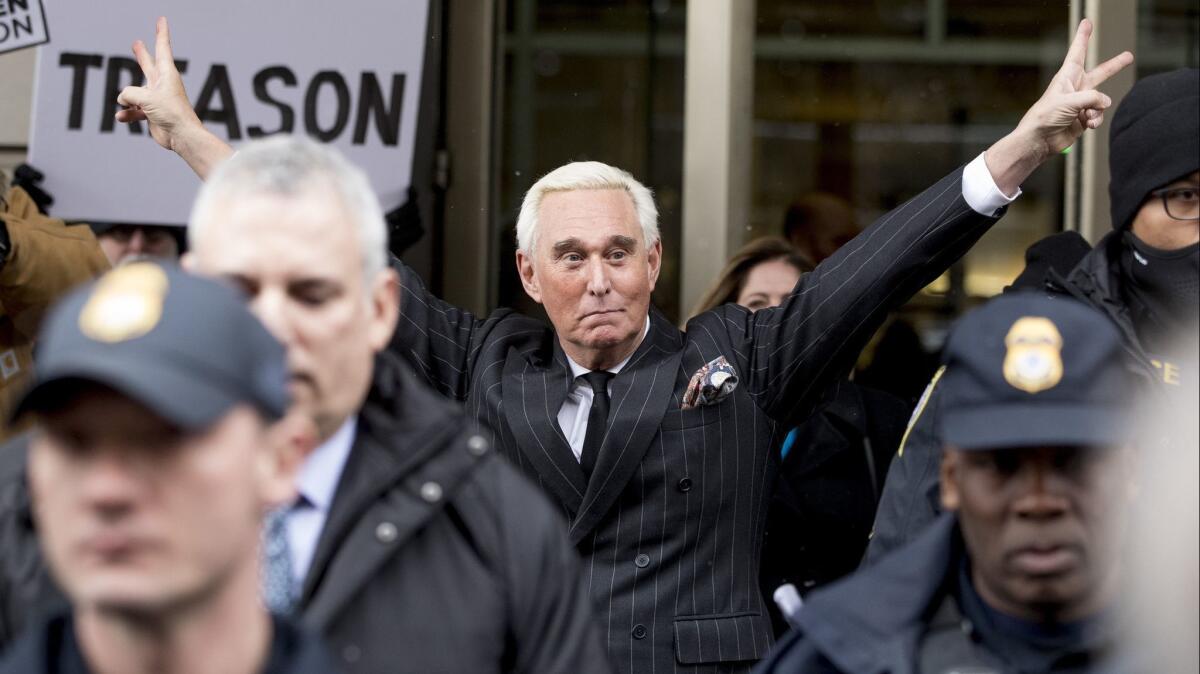Prosecutor says Justice Department told him to go easy on Roger Stone, Trumpâs confidant

WASHINGTON â A federal prosecutor is expected to testify before Congress on Wednesday that he faced political pressure to go easy on Roger Stone, a longtime friend of President Trump who was convicted of lying to Congress in its investigation of Russian interference in the 2016 election.
The allegations were made in prepared testimony that prosecutor Aaron Zelinsky is expected to deliver at a House Judiciary Committee hearing Wednesday examining alleged political interference at the Justice Department.
In the statement, made public by House Democrats, Zelinsky alleges that his agencyâs leadership intervened to recommend a more lenient sentence for Stone, in part because the acting U.S. attorney âwas afraid of the president.â
âWhat I heard â repeatedly â was that Roger Stone was being treated differently from any other defendant because of his relationship to the President,â Zelinsky wrote, adding that he was told that acting U.S. Atty. Timothy Shea was âreceiving heavy pressure from the highest levels of the Department of Justice to cut Stone a break.â
The disclosure comes as the Justice Department has been roiled by controversy over Atty. Gen. William Barrâs repeated efforts to weigh in on cases in ways that appear to benefit the president.
Just over the weekend, Barr successfully removed the top federal prosecutor in New York City who had overseen politically sensitive investigations involving Trump associates. He also has pushed prosecutors to dismiss the case against former national security advisor Michael Flynn, who pleaded guilty to lying to federal agents about his pre-inauguration conversations with the Russian ambassador.
A Justice Department spokeswoman, Kerri Kupec, said in a statement Tuesday night that Barr had âdetermined the high sentence proposed by the line prosecutors in the Roger Stone case was excessive and inconsistent with similar cases.â
âAs he has previously stated, the Attorney General did not discuss the sentencing of Roger Stone with the President or anyone else at the White House and had made the decision to correct the filing before the President tweeted about the case,â she said, adding that Zelinsky never spoke to Barr or the acting U.S. attorney about the sentencing. âMr. Zelinksyâs allegations concerning the U.S. Attorneyâs motivation are based on his own interpretation of events and hearsay (at best), not first-hand knowledge.â
Stone, 67, a self-described âdirty tricksterâ who has a tattoo of President Nixon on his back, was convicted in November of seven felonies including lying to Congress, witness tampering and obstructing a House investigation during the inquiry led by special counsel Robert S. Mueller III. Stone was the sixth Trump associate to be convicted of charges arising from Muellerâs Russia investigation.
In his testimony, Zelinsky described how he and three colleagues won the conviction and submitted a draft of a sentencing recommendation in February to his superiors that called for Stone to receive a sentence in the range of seven to nine years in prison. He was told the memo was strong and that Stone deserved âevery dayâ of the recommendation, Zelinsky wrote.
Two days later, Zelinsky wrote, he was ordered to drop some of the enhancements â essentially aggravating factors that boost a proposed punishment â prosecutors had included in their draft. The result would have reduced the sentencing range. When prosecutors resisted the pressure, he wrote, supervisors told them to recommend a sentence below the guidelines.
âWe repeatedly argued that failing to seek all relevant enhancements, or recommending a below-Guidelines sentence without support for doing so, would be inappropriate,â Zelinsky wrote in his prepared testimony.
In response, he wrote, a supervisor told them that the âU.S. attorney had political reasons for his instructions, which our supervisor agreed were unethical and wrong. However, we were instructed that we should go along with the U.S. attorneyâs instructions because this case was ânot the hill worth dying onâ and that we could âlose our jobsâ if we did not toe the line.â
The prosecutors refused to modify the sentencing recommendation and were allowed to submit it on Feb 10. The next morning, Trump erupted on Twitter, calling the memo âhorrible and very unfair.â
Zelinsky and his colleagues were told by their superiors that the Justice Department would soon be filing a new sentencing memo. The four prosecutors withdrew from the case. That night, a supervisor filed a new memo in federal court, arguing that the original recommendation was excessive but said that Stone deserved prison time.
âThe Department of Justice treated Roger Stone differently and more leniently in ways that are virtually, if not entirely, unprecedented,â Zelinsky wrote.
On Feb. 20, U.S. District Judge Amy Jackson sentenced Stone to three years and four months in prison. He has not yet reported to prison; Trump has indicated he will pardon him before he is jailed.
At the sentencing, Jackson criticized how the Justice Department handled the sentencing, calling it âunprecedented,â and said the original prosecutors had written a brief that had been well-researched and was supported by the facts.
More to Read
Get the L.A. Times Politics newsletter
Deeply reported insights into legislation, politics and policy from Sacramento, Washington and beyond. In your inbox three times per week.
You may occasionally receive promotional content from the Los Angeles Times.











